
How To Change Your Apple ID Password On your Apple iPhone 6s Plus

How To Change Your Apple ID Password On your Apple iPhone 6s Plus
Are you aware of the common mistakes people make when creating their Apple ID passwords, such as using weak passwords and personal information? And how often should you change your Apple ID password? If it’s been a while since your last update, stay in this article to learn how to change your Apple ID password on your account.
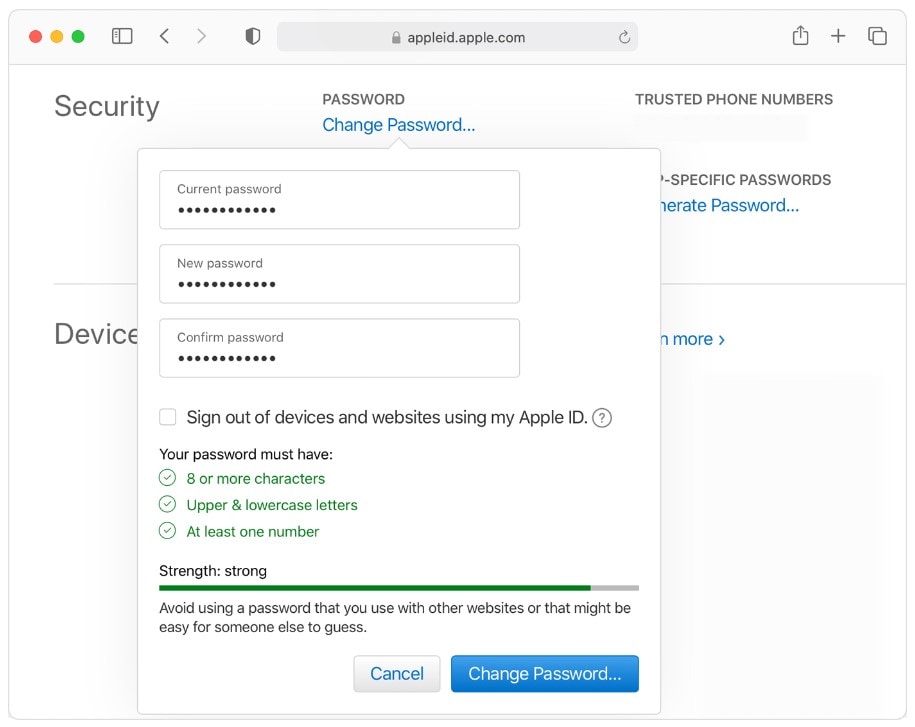
Part 1: Is Your Apple ID Safe? Watch Out for These Signs
Despite your best efforts, there’s always a risk of password compromise. If this happens, a hacker could access all your personal information. They could steal your photos, videos, contacts, and financial data.
They could also use your account to make unauthorized purchases or spread malware. That’s why knowing the signs of a hacked Apple ID password is crucial. If you notice any of the following, you should change your account password immediately:
- Frequent Login Requests
If you notice unusual login attempts or receive notifications from Apple about new sign-ins from unknown devices or locations, it’s a red flag. Someone may be trying to open your Apple account.
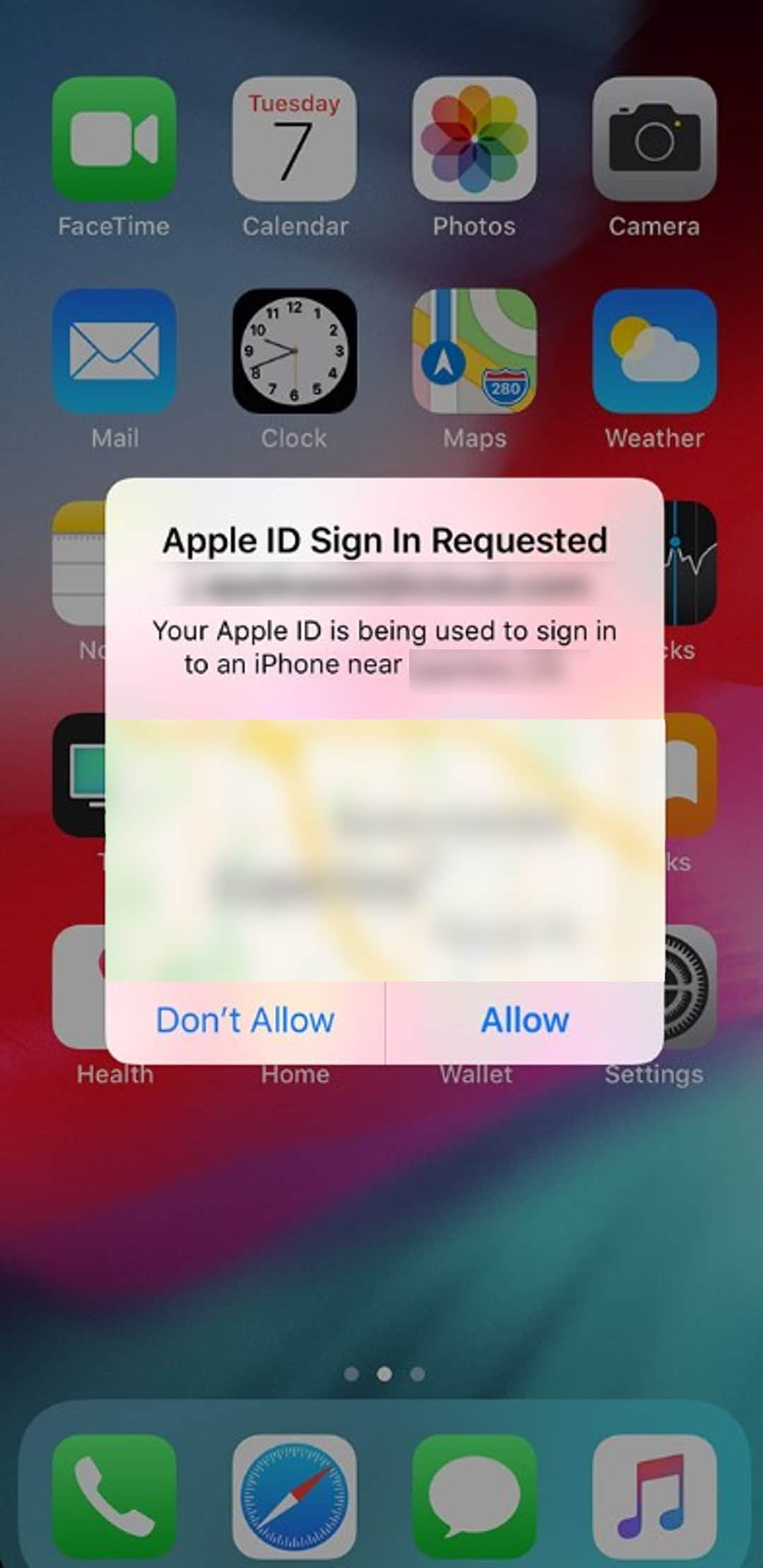
- Unexpected Purchases
Unexplained app or content purchases on your account may indicate unauthorized access. Review your purchase history regularly.
- Password Reset Emails
Receiving emails notifying you of a password change when you didn’t make one is a major concern. It indicates unauthorized access attempts.
- Unusual Emails Sent from Your Account
Friends and family receiving strange emails from your Apple ID should raise suspicion. Phishing attempts often involve emails or messages that appear to be from Apple, asking for your login credentials. Be cautious and verify the source.
- Difficult Logging In
To protect your account from unauthorized access, Apple may lock or disable your account if your password or other account information is entered incorrectly several times.
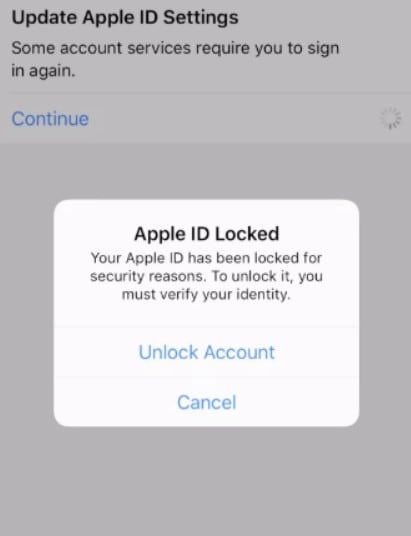
Now that you’re aware of these signs, it’s crucial to know how to change your Apple ID password to fortify your account’s security. Don’t worry; the next section will guide you through the process step by step.
Part 2: How To Change Your Password on Apple ID on Different Devices?
But first, are you now wondering if your Apple ID password is strong enough? Or if it is even secure?
If so, you’re not alone. Millions of people use the same password for multiple accounts. That makes it easy for hackers to break into their accounts. And even if you use a different password for each account, it’s still important to change your passwords regularly. So, before you discover how to change your Apple ID password on your Apple account, here are three things you should consider:
- Complexity
Vary the types of characters in your password to make it more complex and difficult to crack – mix the numbers, uppercase and lowercase letters, and special characters.
- Uniqueness
Be creative, and don’t use publicly available information about you, such as your phone number or birthday. Avoid using common words or phrases that are easy to guess, such as “123456” or “password.”
- Length
Use a password at least 12 characters long, or even longer if possible.
Now that you have a solid foundation for creating a secure Apple ID password. Read on to get to the heart of the matter – how to change the password on Apple ID. Doing it is easy; you can do it on your Apple iPhone 6s Plus, iPad, Mac, or the web.
Step-by-Step Guide: Change Your Apple ID Password on iOS Devices
If you’re looking for a quick and easy way to update your password on your Apple account, you can do it right from your iOS device. It is convenient if you don’t have computer access or are more comfortable using your Apple iPhone 6s Plus, iPad, or Apple Watch. Here’s a guide on how to change your password for your Apple ID account on these devices:
- Step 1: Open the Settings app, then tap [your account name].
- Step 2: Go to Sign-In & Security and tap Change Password.
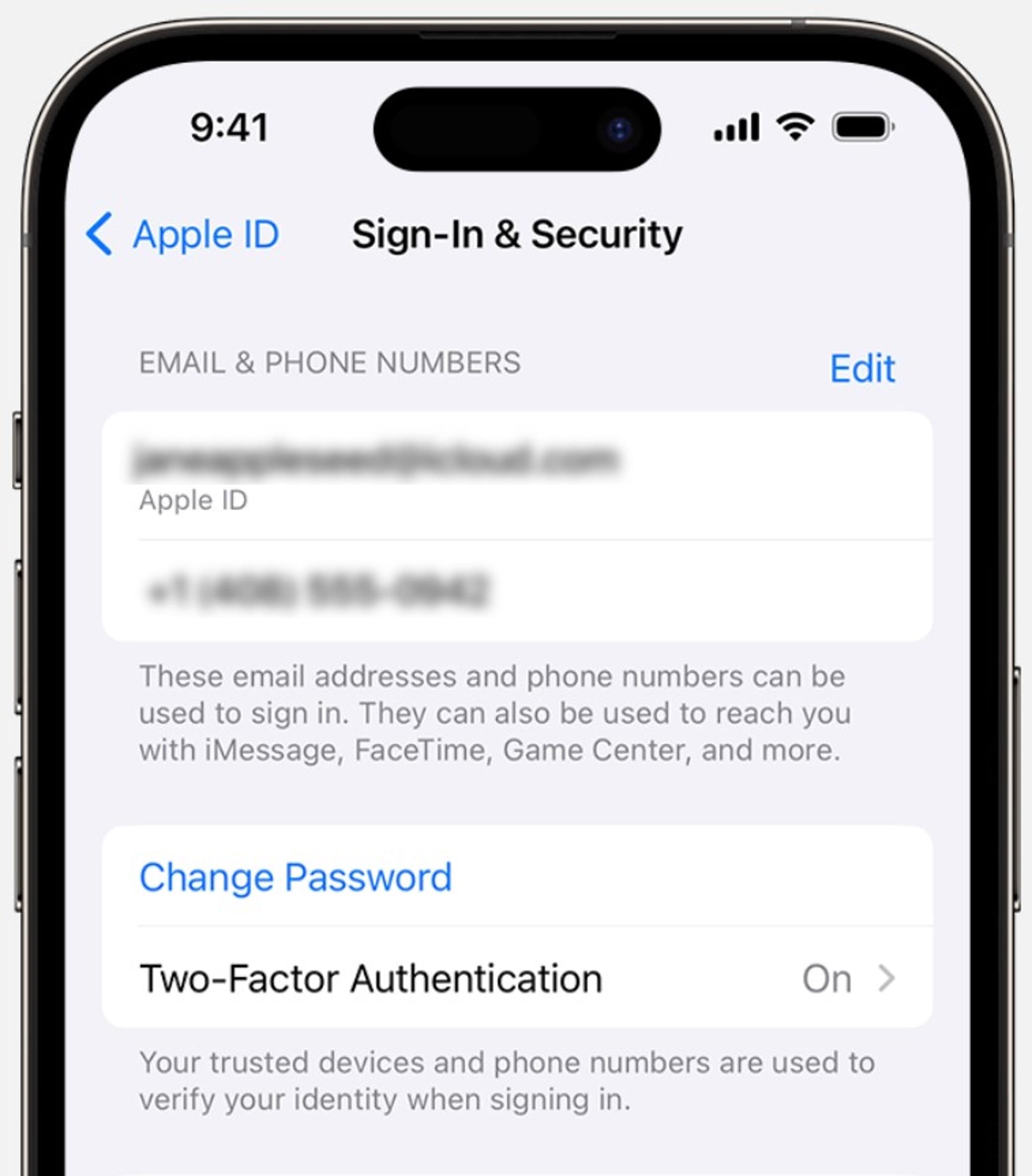
- Step 3: Verify your identity with your current password or device passcode. Then input a new password and re-enter it to confirm.
- Step 4: Tap Change Password or Change.
Step-by-Step Guide: Change Your Apple ID Password on macOS
Mac computers typically have larger screens than other iPhone or iPad devices, so it’s easier to see and enter your password. If you would like to know how to change your Apple ID password on your Mac, follow the steps below:
- Step 1: Go to Apple Menu > System Settings > [your name].
- Step 2: From the Sign-In & Security section, click Change Password.
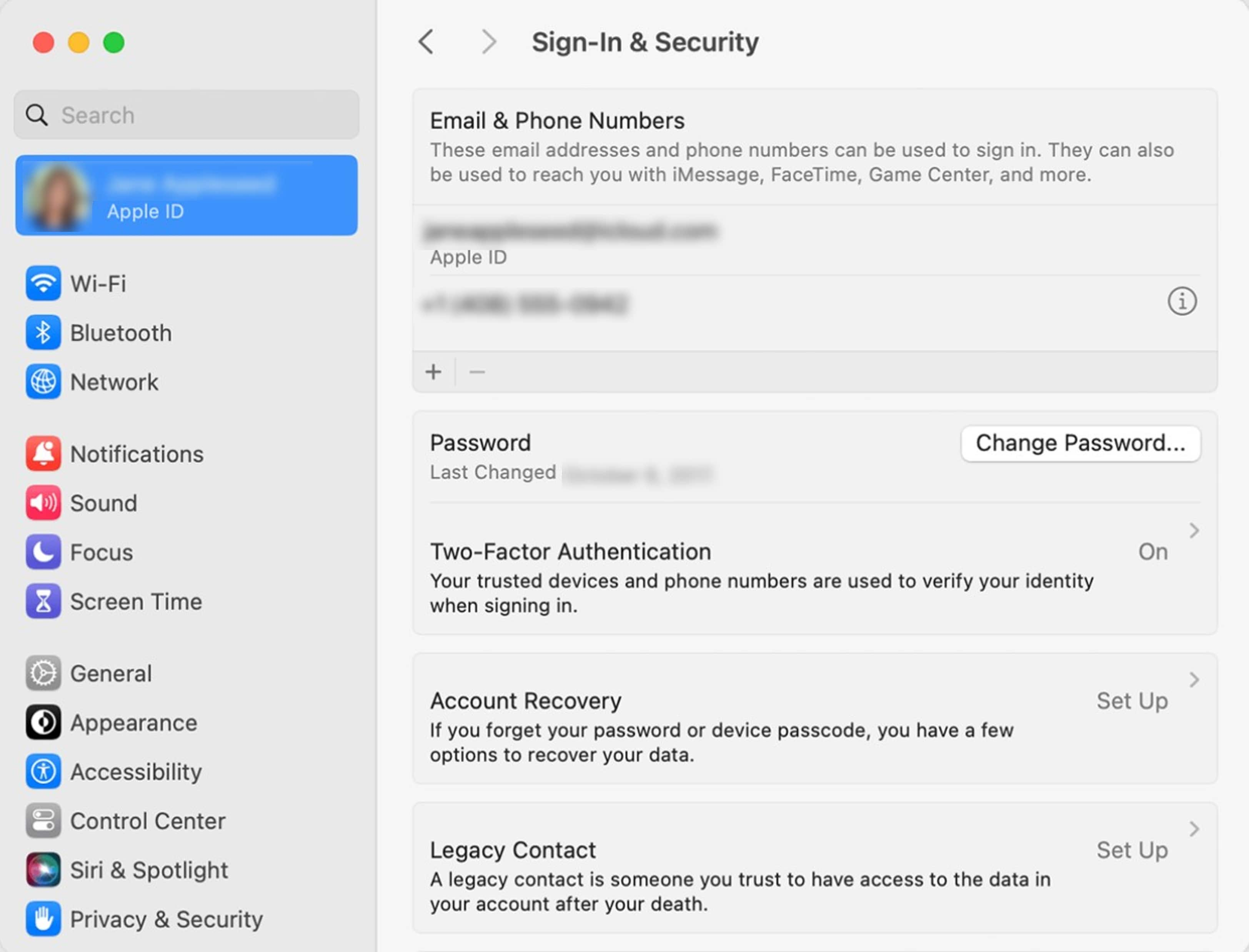
- Step 3: Enter your Mac’s login password to reset your Apple ID password.
Step-by-Step Guide: Change Your Apple ID Password Online
Web browsers are available on a wider range of devices than iOS devices. If you want to learn how to change your Apple ID password on Chrome, Safari, and other browsers, here’s how you do it:
- Step 1: On a web browser, visit the website of Apple ID and sign in to your Apple account.
- Step 2: Click Password below the Sign-In and Security section.
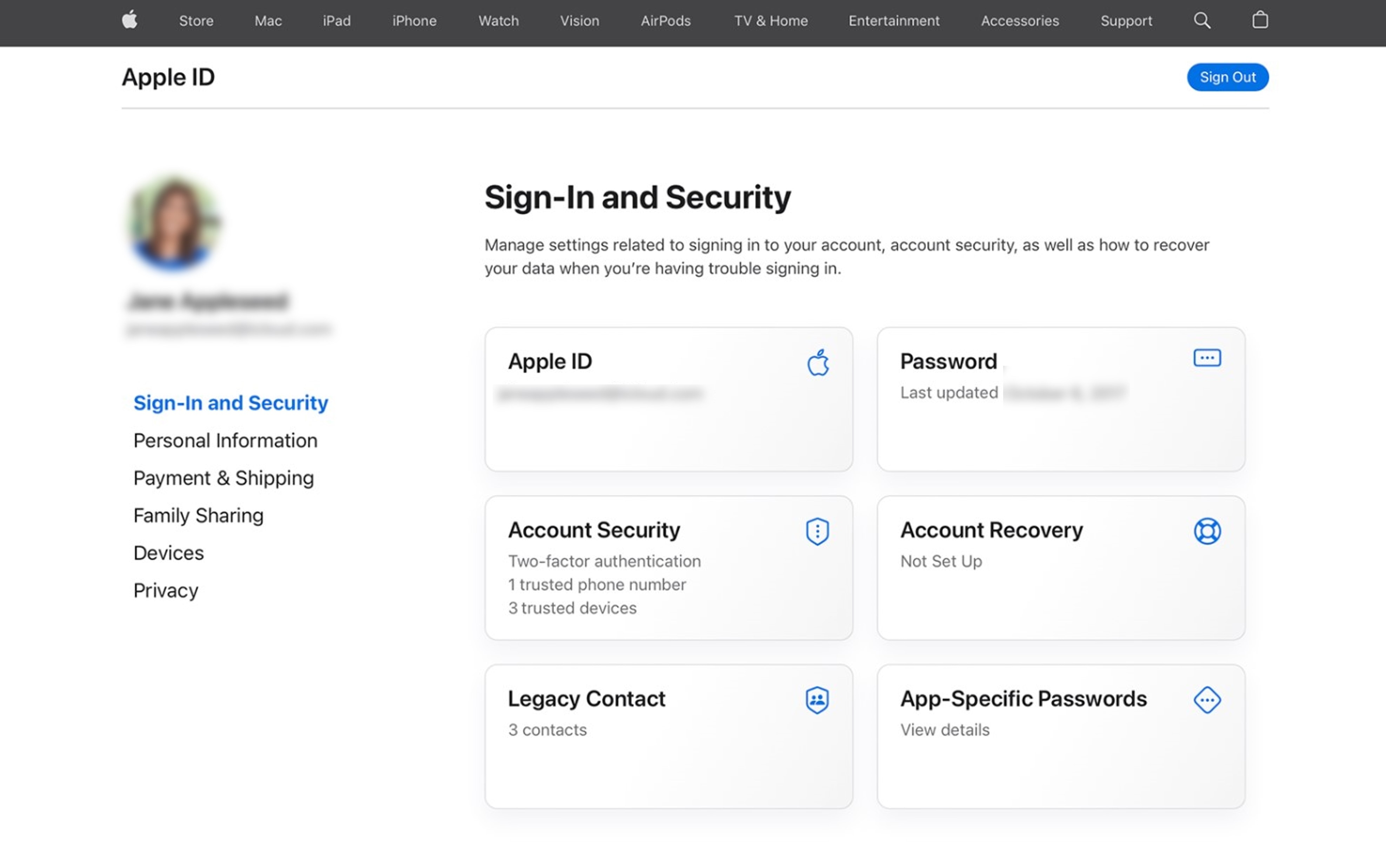
- Step 3: Authenticate with the current Apple ID password, then enter a new password.
- Step 4: Once confirmed, select Change Password.
Password updated! You’re one step closer to keeping your Apple account safe and secure. However, if you’re still having trouble changing your Apple ID password, the next section might help you.
Part 3: Can’t Change Your Apple ID Password? Here’s What You Should Do
It’s happened to everyone: you try to change your Apple ID password, but something goes wrong. Maybe you get an error message or can’t remember your current password. Whatever the reason, there are a few workarounds to change your Apple account password.
Change Your Apple ID Password on a New Device
Did you get a new Apple device or forgot your Apple ID password? No problem! Try these two things before and after setting up your new iOS device.
Before Your Device Setup
Click Forgot password on the Apple ID sign-in page on the web browser. This option is typically found during the setup process for a new Apple device or when you try to sign in to an Apple service on an unsigned-in device.
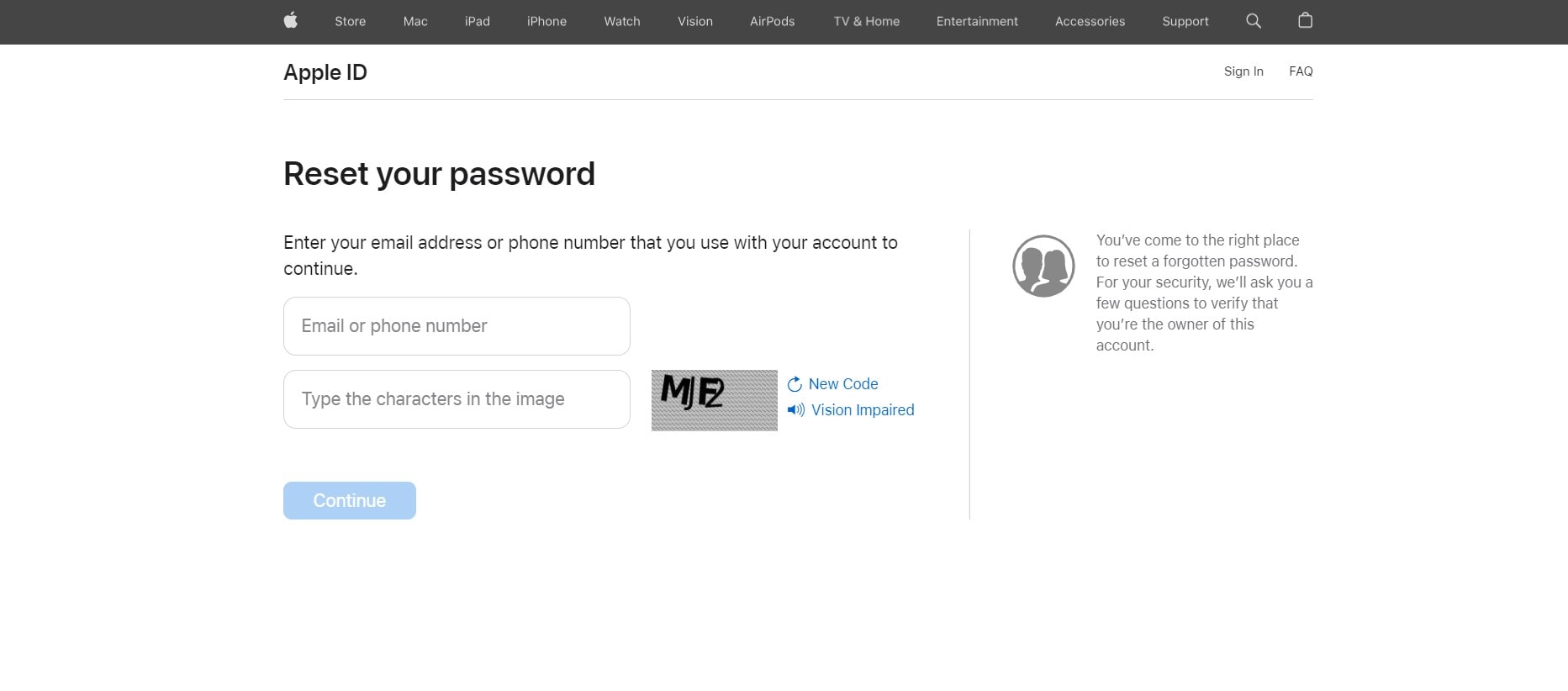
After You Setup Your Device
Need to create a new Apple ID or reset your password after setup? You can find the “Forgot password or don’t have an Apple ID?” in your Settings app. Here’s how to find it:
On an iPhone or iPad
For iOS users:
- Step 1: Open the Settings application and tap Sign-In to your Apple iPhone 6s Plus or iPad.
- Step 2: Tap Forgot password or don’t have an Apple ID? and follow the in-app guide to proceed.
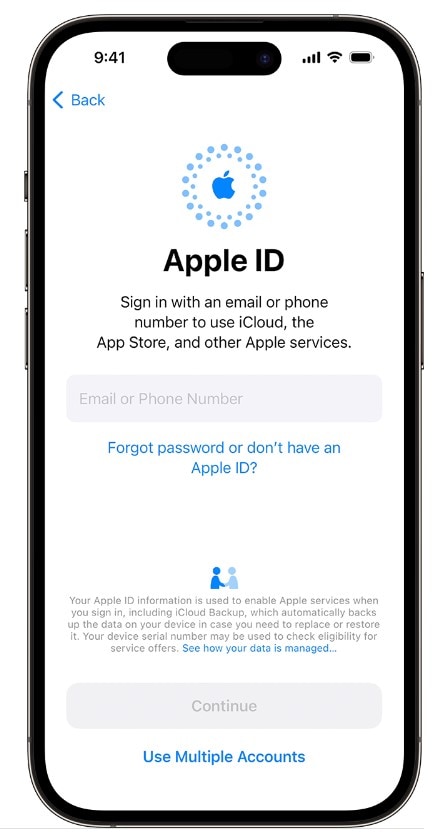
On a Mac Computer
If you prefer to use your desktop:
- Step 1: From the Apple menu, go to System Settings.
- Step 2: Click Sign in with your Apple ID and click Forgot password.
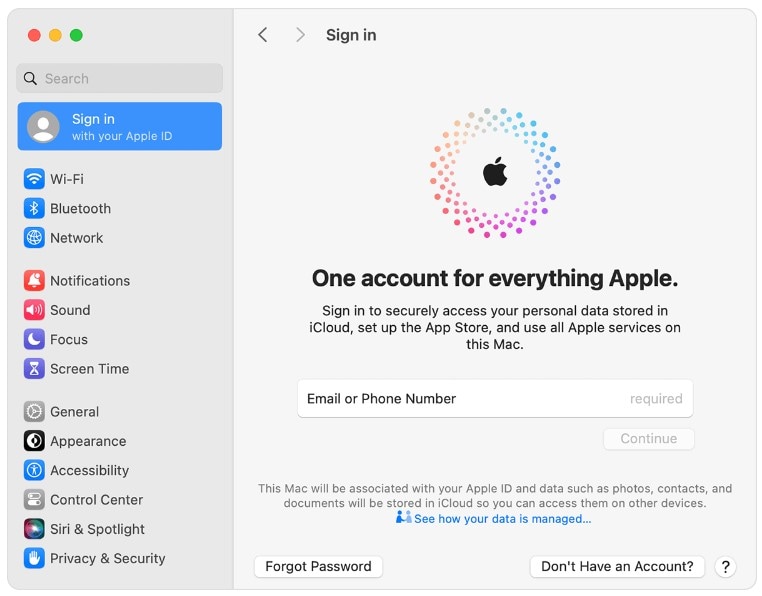
- Step 3: Follow the on-screen instructions to reset your password or recover your account.
Reset Your Apple ID Password Using a Family Device
Losing your phone or being unable to access your iOS device can be a major inconvenience. But it doesn’t have to mean you’re locked out of your Apple ID account. Even if you don’t have your Apple device with you, you can still reset your password and get back to using your family’s Apple devices.
- Step 1: Open the Apple Support app or download it from the App Store if not yet installed.
- Step 2: From the Support Tools section, select Reset Password.
- Step 3: Select A different Apple ID and tap Continue.
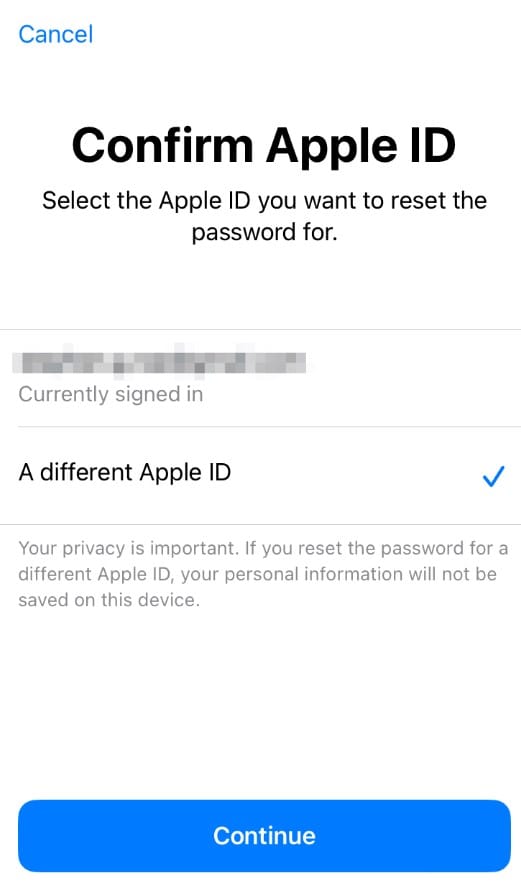
- Step 4: Follow the in-app guide to reset your Apple ID password.
You can also designate a friend or family member you trust as your account recovery contact. They can help you reset your password if you forget it by providing a recovery code upon request.
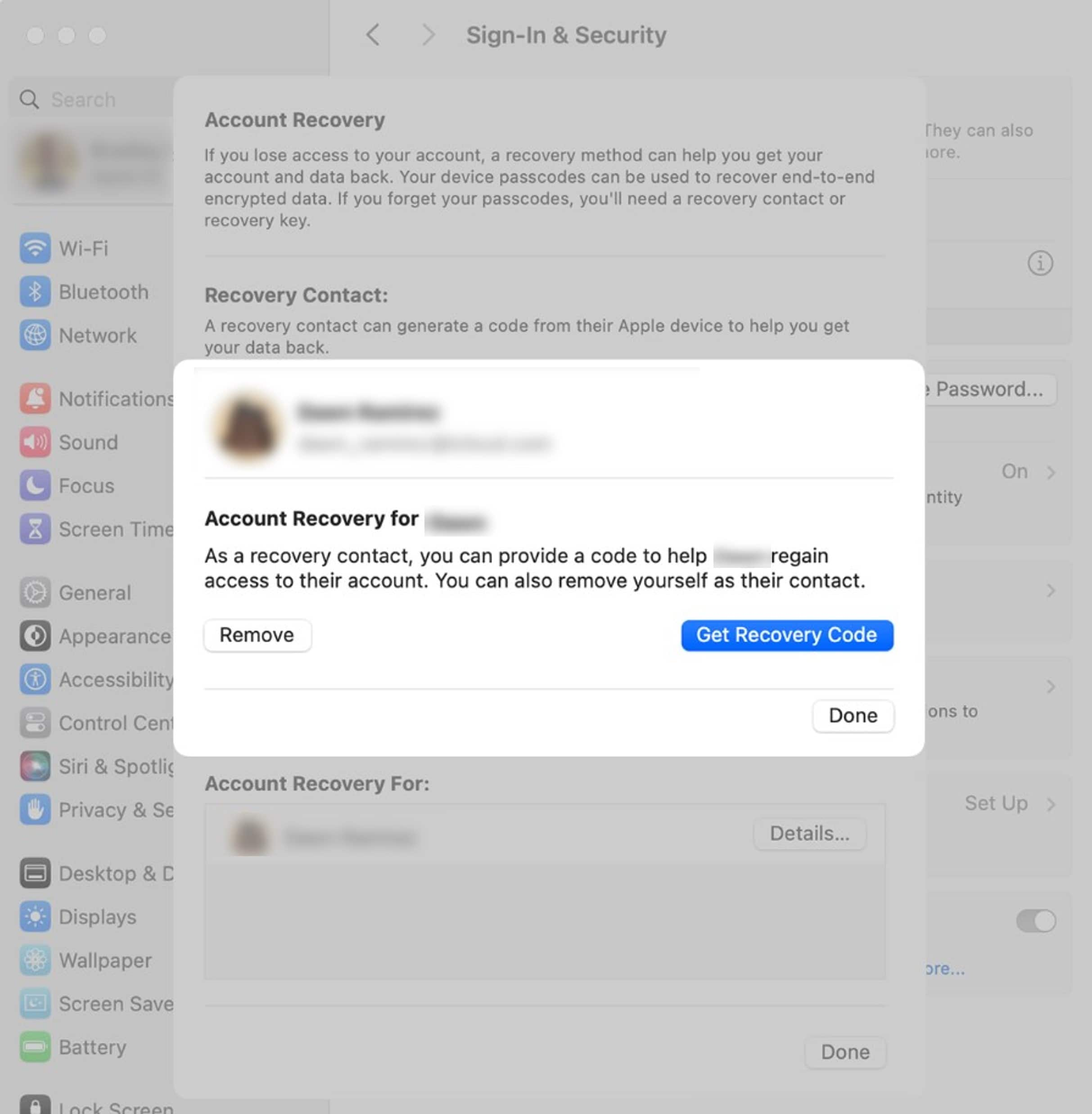
Still Can’t Change Your Apple ID Password? Try Account Recovery
The previous section showed you how to change your Apple ID password on any device if you cannot reset it. But what if you’ve tried all the steps in that section and you’re still having trouble?
There’s still one more option available: submit an account recovery request to Apple.
Account recovery is a process that can help you regain access to your Apple ID account if you don’t have enough details to change your password or if you use two-factor authentication. The caveat? Account recovery can be lengthy and might take several days or longer. However, there are a few ways to expedite the recovery process:
- Confirm the six-digit code sent to your primary email address to prove that you’re the account’s rightful owner.
- Provide your credit card details. Apple will send an authorization request to your credit card issuer, which will help verify your identity.
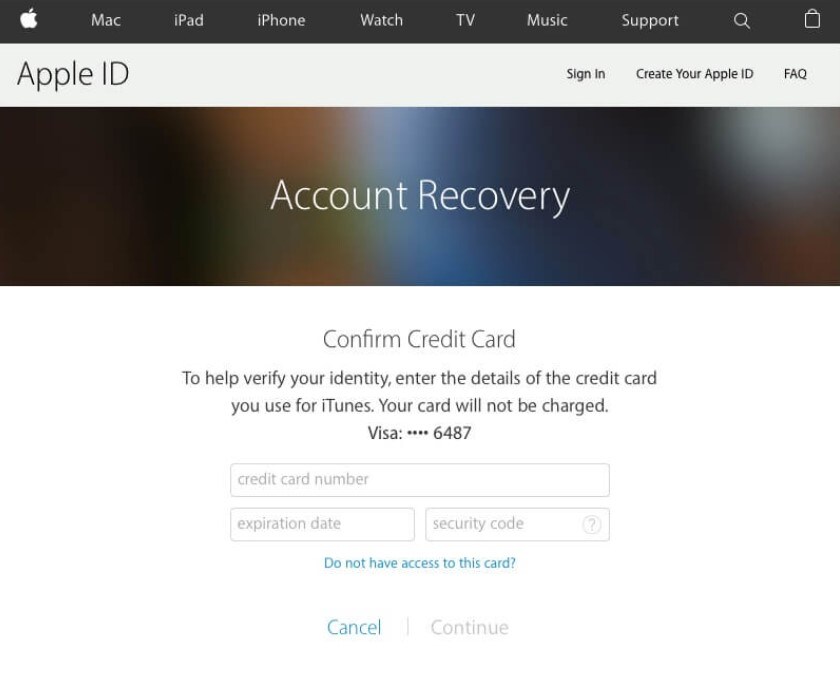
If you need to access iCloud services and Apple ID features faster, a third-party tool like Wondershare Dr.Fone may help.
You May Also Like:
3 Ways to Recover iCloud Password
Complete Guide to Unlock Mi Account Without Password In 2023
[2023 Updated] How to Sign Out of Apple ID without Password?
Part 4: Using Dr.Fone Unlock Tool To Access Your Apple Account Sooner
Dr.Fone Unlock can help you remove your Apple ID from your Apple devices without a password, even with the enabled Find My/Find My iPhone feature. It’s compatible with all iOS devices running iOS 17/iPadOS 17 and iPhone 14.
How To Remove Your Apple ID if You Forgot Your Apple ID Password?
Dr.Fone is easy to use and intuitive, even for users with no technical experience. Here’s a step-by-step guide on how to use Dr. Fone’s iOS Screen Unlock feature and remove your Apple ID:
Step 1: Download Dr.Fone from their official website and install it on your computer.
Step 2: From the Toolbox homepage, select Screen Unlock > iOS.

- Step 3: Select Remove AppleID and click Unlock Now on the next screen.
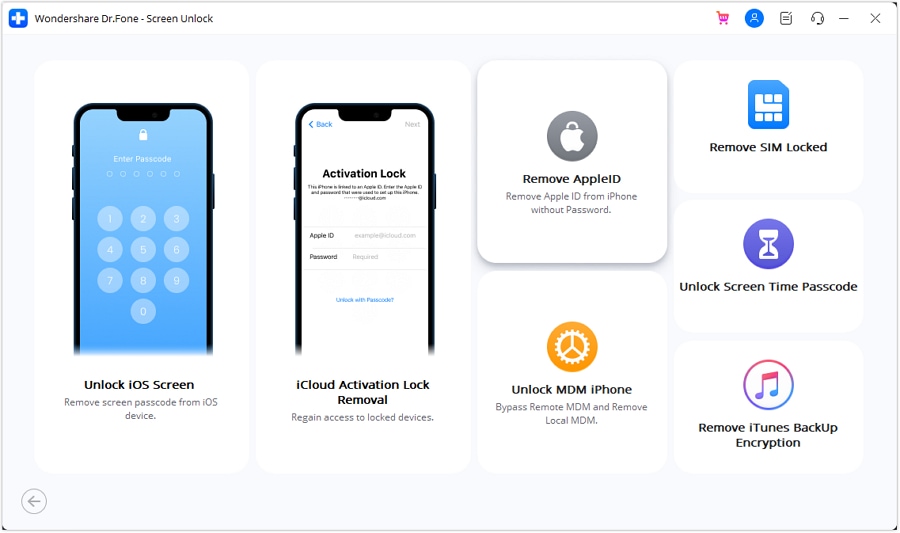
- Step 4: For the question, “Have you set up a screen lock on your Phone?” click Yes. Then, on the next screen, click Yes again to verify you enabled the two-factor authentication.
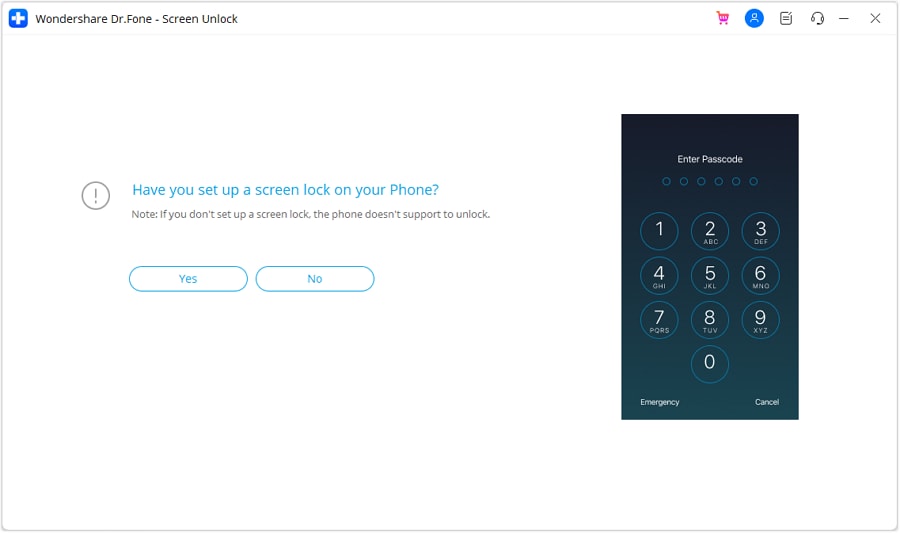
- Step 5: Follow the in-app instructions to put your iOS device into Recovery Mode.
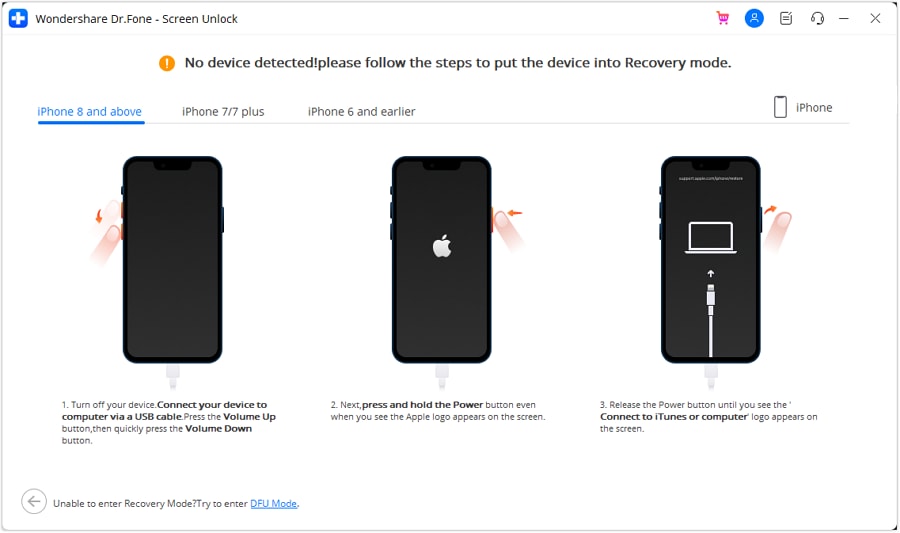
- Step 6: Select an option from the System Version dropdown list for the Device Model, then click Start.
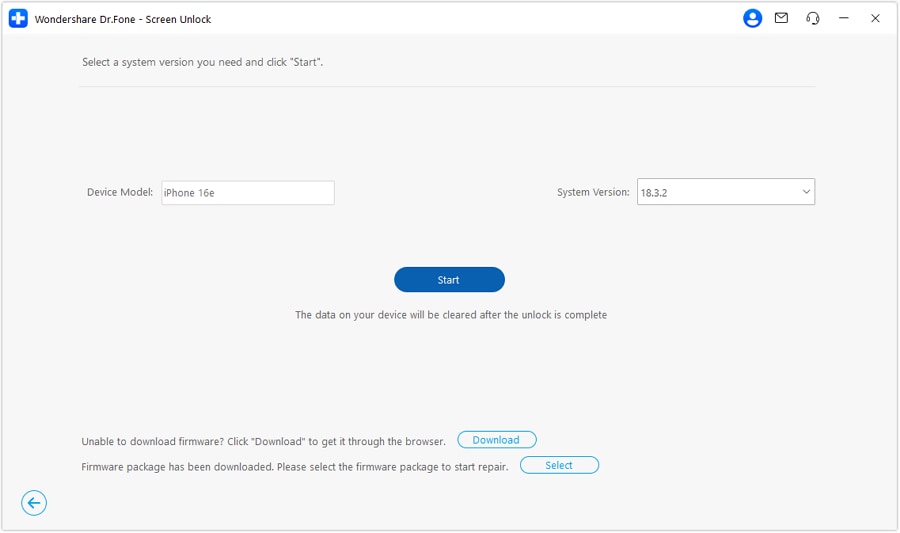
- Step 7: Wait while the iOS firmware is downloading, then click Unlock Now once done.
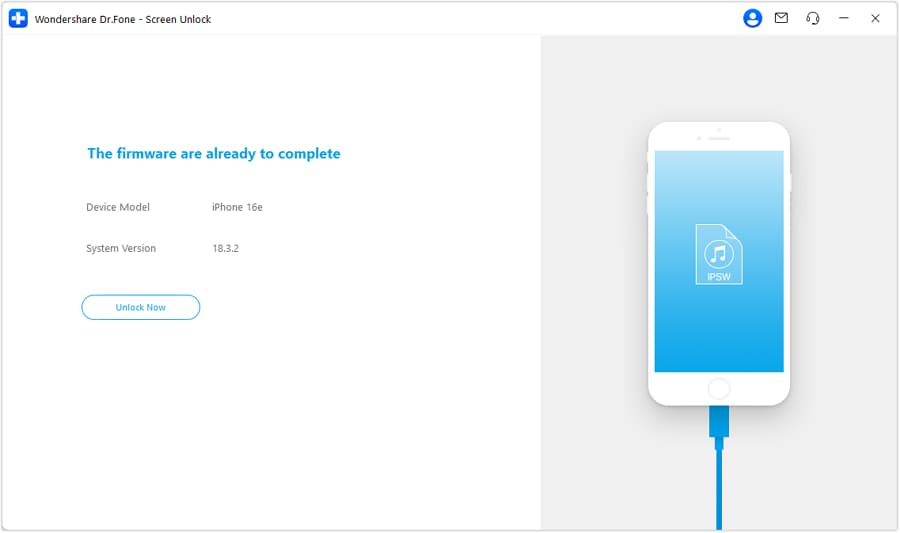
- Step 8: Enter the code given in the Warning dialogue box and click Unlock to continue.
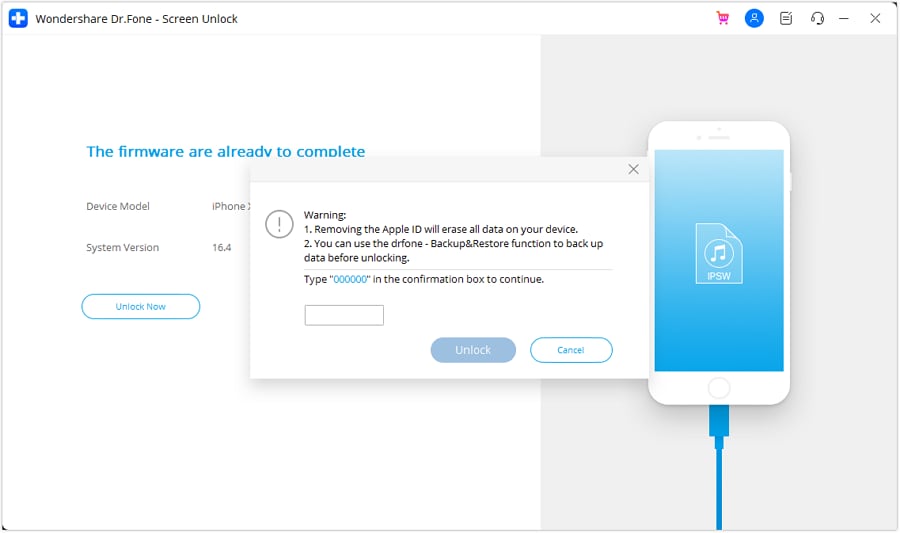
- Step 9: Wait and do not use your device while the Apple ID removal is in progress to avoid being a bricked device.
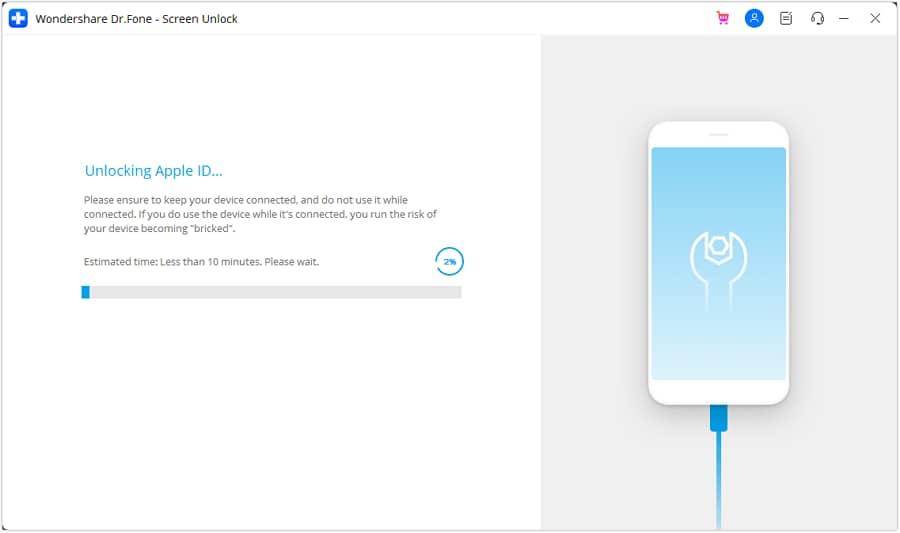
- Step 10: Click Done once the process is successful or click Try again to repeat.
Conclusion
Creating a strong Apple ID password is simple: mix letters and numbers, make it lengthy, and keep it unique. Regularly changing your Apple ID password using the steps above is key to protecting your digital data. And if you ever find yourself locked out, consider the Dr.Fone Unlock Tool, a reliable mobile solution. Stay private and secure to enjoy your Apple experience with peace of mind.
How to Unlock Apple iPhone 6s Plus without Passcode or Face ID
You can’t access your Apple iPhone 6s Plus because the Face ID isn’t working, and you forgot your passcode? So you are considering how to unlock iPhone without face ID or passcode. If so, this article will walk you through how to do that.
Firstly, one ought to realize that it is impossible to hack an iPhone passcode. Therefore, the primary way that attempts to unlock your device without a PIN or Face ID is to erase it. After reading this guide, you will figure out how to unlock iPhone without passcode or face ID. Keep reading to find out more and learn about the best tools in the business.
Part 1: Best Ways to Unlock iPhone without a Passcode or Face ID
1. Unlock it via Find My
- Go to the iCloud official site, and sign in to your iCloud account. The site will give you two or three choices when you log in. Click on “Find iPhone” to proceed.
- You will be taken to another interface. Click “All devices” and select the Apple iPhone 6s Plus on which you need to erase the passcode.
- Click on “Erase iPhone”, and afterwards affirm the decision. That’s the simplest solution for how to unlock iPhone without passcode or face ID.

2. Via iTunes
Step 1. Go to Recovery Mode
Entering the recovery mode requires various steps, given your Apple iPhone 6s Plus model or settings. Assuming you’re uncertain which one you have, check the rear of your phone or the client manual you got in the first box.
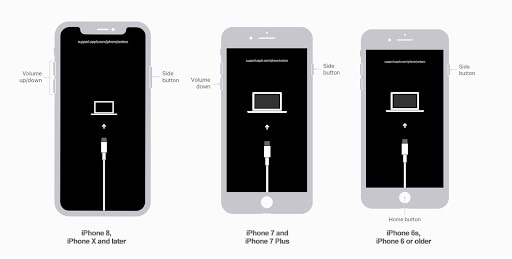
iPhone 8 and Above:
- Hold the Side button used to lock your screen and both Volume buttons. The power-off slider will show up on the screen.
- Drag the slider to one side to switch off your Apple iPhone 6s Plus.
- Use a lightning connector to plug your Apple iPhone 6s Plus into a Macintosh or PC while holding the Side button.
- Keep holding the button until the recovery screen shows up.
iPhone 7/7 Plus:
- Hold the Side button used to lock your screen until the power-off slider shows up.
- Switch off your Apple iPhone 6s Plus.
- Connect your Apple iPhone 6s Plus to a Macintosh or PC through a connector while holding the Volume (-) button.
- Continue to press the button until you get to recovery mode.
iPhone 6 or Below:
- Hold the Side or Top button and trust that the power-off slider will appear.
- Switch off your Apple iPhone 6s Plus.
- Connect your Apple iPhone 6s Plus to a system through a connector while holding the Home button.
- Keep the Home button held until you see the recovery screen.
Step 2. Select your Device on your System
After entering recovery mode, you’ll have to continue on your Macintosh or PC. Then, contingent upon your OS, follow the aide underneath to begin unlocking your Apple iPhone 6s Plus.
macOS Catalina
- Go to the Finder window.
- Your Apple iPhone 6s Plus will appear on the left half of the Finder window under Locations. You can tap on it to choose it.

macOS Mojave or a Windows with iTunes
If your gadget isn’t running macOS Catalina or later, you’ll need to involve iTunes to connect your Apple iPhone 6s Plus. In the first place, download iTunes on your PC. Then, take the appropriate steps depending on which iTunes version you’re running:
- On iTunes 12 and newer, click on the Apple iPhone 6s Plus symbol in the upper-left corner of the iTunes window.
- On iTunes 11, click on the Apple iPhone 6s Plus tab on the right half of the iTunes window.
- On iTunes 10, the Apple iPhone 6s Plus will be in the sidebar on the left.
Step 3. Pick the Choice to Restore
When you’ve effectively connected and chosen your Apple iPhone 6s Plus on a Mac or a PC, tap on the Restore button. And that’s how to unlock iPhone without passcode or face ID.
3. DNS Server
The following steps explain how to unlock iPhone without face ID or passcode using a DNS server:
Step 1. Pick your LANGUAGE and COUNTRY from the lock screen menu after switching on a locked device.
Step 2. Click “Continue” to enter the WiFi settings page. Whenever requested to connect to WiFi, search for the “I” next to the WiFi tab.
Step 3. Disconnect your current network, go to “Network/connection Settings”, and click Forget.
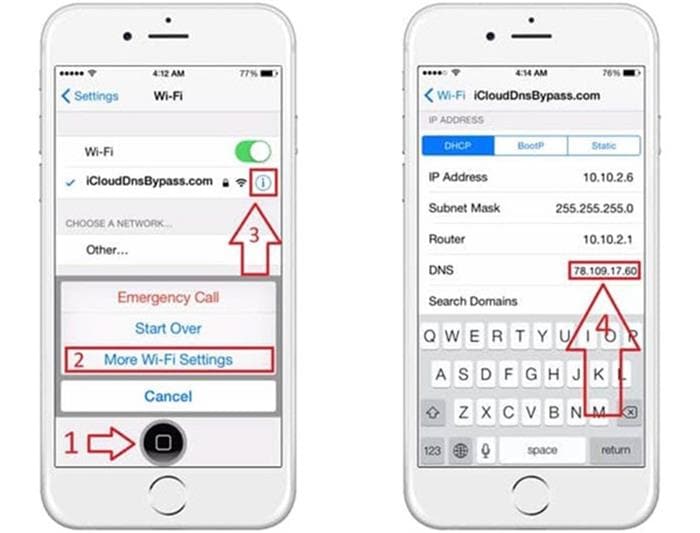
Step 4. Click the “I” and enter a DNS server IP address to bypass the lock. IP addresses of different regions are given below:
- USA: 104.154.51.7
- South America: 35.199.88.219
- Europe: 104.155.28.90
- Asia: 104.155.220.58
- Australia and Oceania: 35.189.47.23
- Others: 78.100.17.60
Step 5. Then, click the “Back” choice at the left half of your screen, turn the WiFi on and select your network. Enter your WiFi passcode.
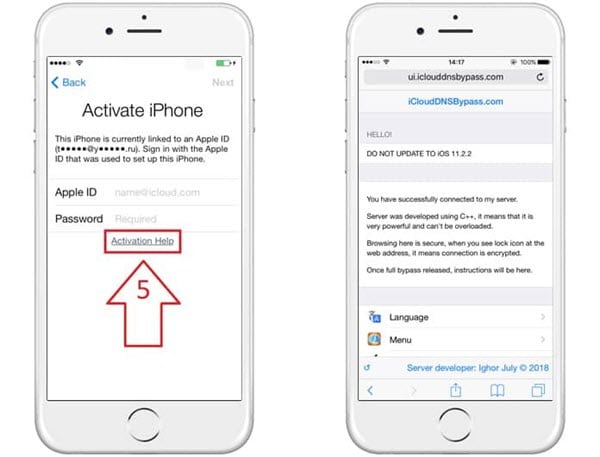
Step 6. Click Next Page > Back to enter the lock bypass screen. These are all the required steps for how to unlock iPhone without passcode or face ID 2022.
4. Dr.Fone-Screen Unlock
This section will introduce you to our most important solution. Yes, you heard it right. If you need a hassle-free method to unlock your iDevice without a passcode or face ID, use Wondershare Dr.Fone Screen Unlock.
Dr.Fone will not only remove the screen lock but also make sure to keep your identity safe. In addition, it is the easiest method and requires no prior knowledge. So if you are someone new to this technology, we suggest you follow the steps below:
Step 1. Launch the Software on your PC
After successfully installing Dr.Fone on your PC, open it and select the “Screen Unlock” tool from the main interface.

Next, connect your locked phone to the system through a wired connection. Then go for the iOS screen unlock feature.
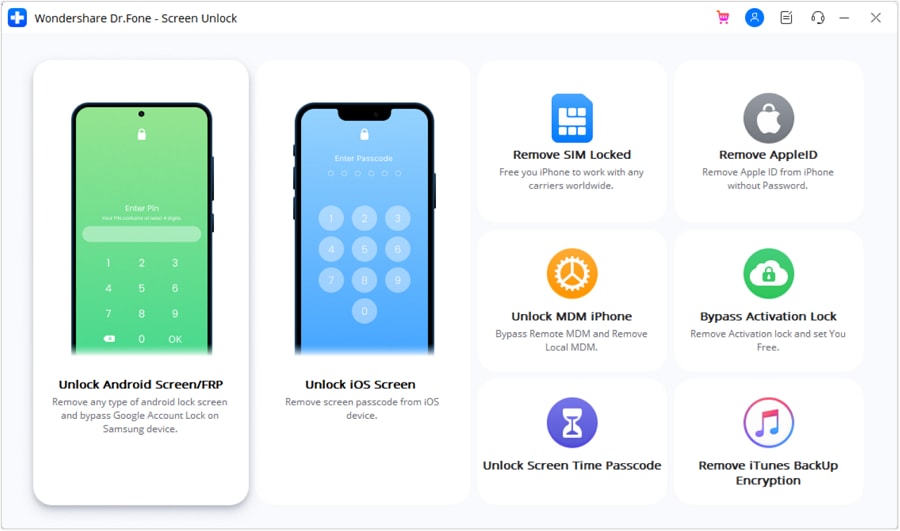
Step 2. Recovery or DFU Mode Boot
It is necessary to first boot your locked device in recovery or DFU mode. Follow the guidelines on your screen to do so. The Recovery mode is the suggested way for iOS screen locks. If you can’t actuate this mode, go for the DFU mode boot.
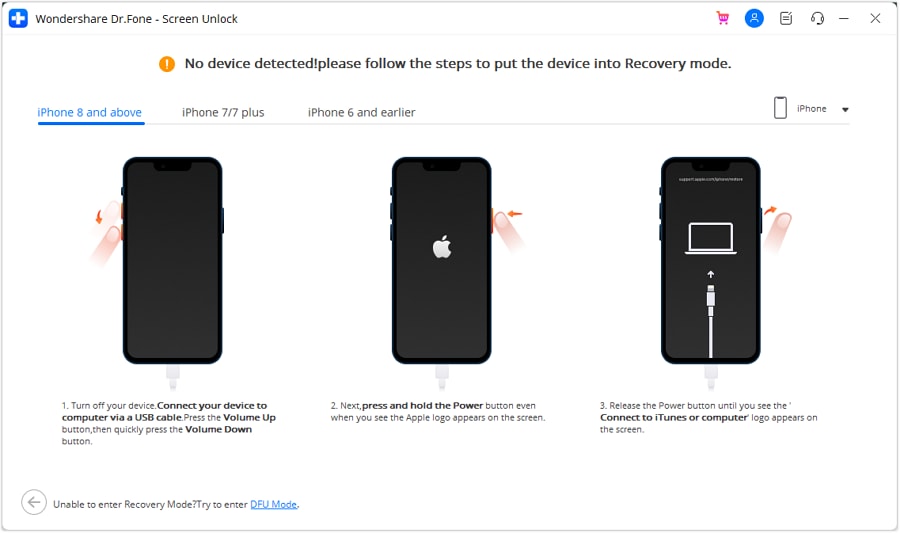
Step 3. Select your Apple iPhone 6s Plus Model
After the phone is in recovery/DFU mode, the program will show the locked device’s information. Here you can see the model and iOS variant of the Apple iPhone 6s Plus device. If it isn’t correct, you could choose the right one from the dropdown menu next to it. After that, click the Download button to get the required firmware for your locked phone.

Step 4. Remove the Screen Lock
After downloading the firmware effectively, click the “Unlock Now” button to let Dr.Fone unlock your Apple iPhone 6s Plus.

Simply in no time, Dr.Fone will successfully unlock your device.
Note: This unlocking process will erase everything off your Apple iPhone 6s Plus and bring it to the factory default state. Indeed, no other method that doesn’t allow data erasure at the moment.
Part 2: How to Turn Off Passcode or Face ID on My Device?
Face ID can be a helpful method for unlocking your Apple iPhone 6s Plus - by simply looking at your phone. However, a few clients might worry that it’s not as secure as utilizing a PIN to open your phone. If that is the best case for you, you can follow this manual to disable Face ID and depend on a passcode.
Here’s the step-by-step guide to the most effective method to switch off Face ID on the iPhone:
1. Open the Settings application
First, tap on your Settings app to open it. That is the one on the home screen with a symbol like the mechanical gear.
2. Tap on Face ID and Passcode
On the Settings menu, tap on the Face ID and Passcode menu.
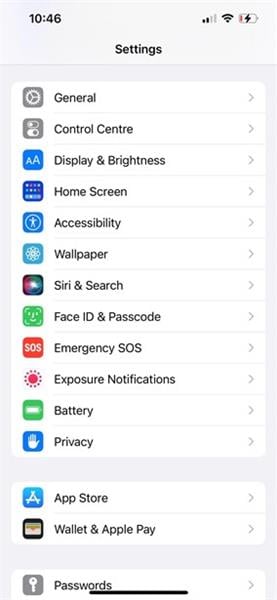
3. Enter your passcode
At this stage, you’ll be approached to enter your passcode, so do this to get to the Face ID and Passcode menu.
4. Switch off Face ID
You’ll have the option to turn off the switch for Face ID across different activities, including the phone unlock.
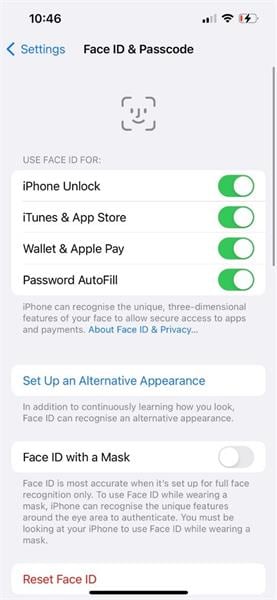
Part 3: Can I bypass my iPhone Face ID with a picture?
As indicated by Apple, the short and obvious answer is no.
FaceID isn’t simply a camera snapping a picture. It utilizes an exceptional chip to filter the face with many spots. It makes a 3D contour of the look that works in low, glorious light around evening time, and your eyes must be opened. The opportunity to randomly unlock an iPhone with FaceID is 1/1 million, compared to 1/50000 with Touch ID.
It doesn’t work by snapping a picture of your face, but by taking a contour of your face if you utilize a camera that can see infrared. However, a photograph is a level and cannot give a dab matrix required for Face ID to work. You may be holding a clear piece of paper before the phone.
The Bottom Line
That’s all about our take on how to unlock iPhone without passcode or face ID 2022. We have worked hard to make sure you get the right solutions in hand. However, we strongly suggest Dr.Fone if you still face issues with our solutions. Even if the above methods fail, Dr.Fone will ensure you unlock your phone.
How To Fix Auto Lock Greyed Out on Apple iPhone 6s Plus
Auto-lock on iOS devices serves multiple purposes - it conserves battery life, secures your data, and more. But have you encountered the Auto-Lock greyed-out dilemma, fixed at 30 seconds? When this setting becomes inaccessible, it limits your control over screen timeout.
Read on if you’ve encountered a similar problem on your iOS device. In this guide, we’ll explore the possible reasons and offer steps to fix Auto-Lock greyed out on iPhone and iPad devices. If force restarts or settings resets haven’t worked for you, we’ve got alternative solutions. Let’s get started.

Part 1: Why Is Auto-Lock Greyed Out on iOS Device?
There are a few reasons why the Auto-Lock might be greyed out on your Apple iPhone 6s Plus or iPad device, preventing you from adjusting the duration. Here are the most common culprits:
Low Power Mode
When you activate Low Power Mode on your iOS device, you might notice the screen automatically locking after 30 seconds of inactivity. This quick sleep setting, implemented to minimize power usage, explains why the Auto-Lock option appears greyed out and inaccessible.
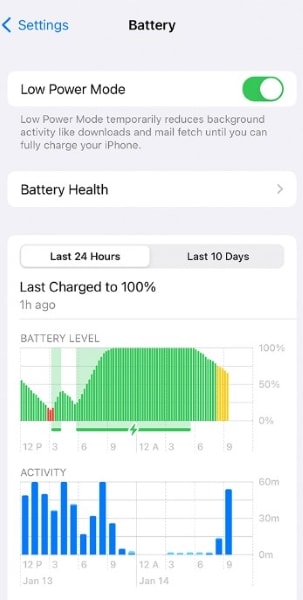
Screen Time Restrictions
Screen Time restrictions can impact Auto-Lock. For instance, if your downtime schedule blocks all apps, the screen locks itself, even if the Auto-Lock timer hasn’t run out.

MDM Profile Restrictions
If the Auto-Lock is greyed out on your iPad or iPhone and you use it for work or school, a Mobile Device Management (MDM) profile might be the reason. This profile restricts settings, including Auto-Lock. To fix this, contact your IT administrator and ask if they can adjust the MDM profile settings.
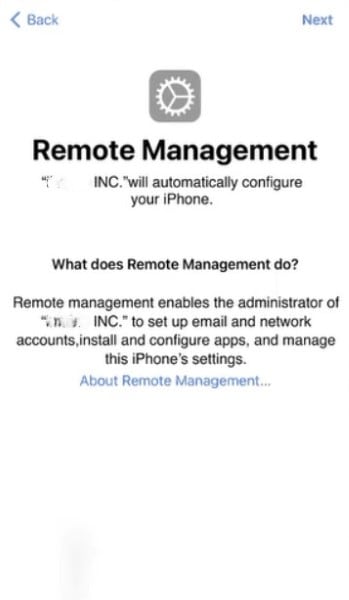
Alright, you know the possible reasons why the Auto-Lock option is not working on your iOS device. Still, you might be wondering how to fix the Auto-Lock greyed-out issue. Below are several ways to get your iPad or iPhone Auto-Lock working normally again.
Fix No.1: Disable Low Power Mode
Your iPhone Auto-Lock greyed out because Low Power Mode limits background activities, including the Auto-Lock option. In this mode, you cannot change the Auto-Lock settings. Turn off Low Power Mode to fix this issue and choose your preferred timeout. Here’s how:
- Step 1: Go to your Apple iPhone 6s Plus or iPad’s Settings app.
- Step 2: Scroll down and tap Battery. It will show you your device’s battery usage and available settings.
- Step 3: Turn off the Low Power Mode. Now, the greyed-out Auto-Lock option in Settings should be available again.

Low Battery Mode can stretch your battery life further. But if you need your screen to stay on longer, like while reading an article or watching a video, you can turn it off. It lets you adjust the screen timeout in Settings so it stays awake for as long as you like.
Fix No.2: Check Screen Time Restrictions
You’ve ruled out the Low Power Mode, but the Auto-Lock greyed out on iPad or iPhone remains. If Low Power Mode isn’t causing the problem, your screen time settings might be the issue. Some app restrictions can limit your screen use to specific times, causing it to lock automatically. Resolve this by removing limits, such as downtime and app restrictions, or turning it off.
- Step 1: Open the Settings app on your iOS device.
- Step 2: Go to Screen Time, then scroll down.
- Step 3: Tap Turn Off Screen Time.

Fix No.3: Remove MDM Configuration Profile
A configuration profile is a file that contains settings and restrictions that can be applied to an iOS device. Organizations, schools, or IT administrators often use it to manage devices remotely and enforce specific configurations. Once installed, the settings within a profile override the Apple iPhone 6s Plus device’s default settings. It can include restrictions related to security, network access, app usage, and more.
Since an MDM configuration profile causes limitations, like the greyed-out Auto-Lock on iPad, removing it can be the solution. Doing so frees your iOS device from external settings imposed by the profile. Then, it could allow you to adjust the Auto-Lock time setting as you normally would.
Step 1: See the configuration profiles you installed on your iOS device.
Go to Settings> General > VPN & Device Management on your Apple iPhone 6s Plus.
Go to Settings> General > Profiles & Device Management on your iPad.
Step 2: Select the configuration profile you need to delete.
Step 3: Tap Remove Profile, enter your device passcode, then tap Remove.

Fix No.4: Remove Network Settings Installed by MDM
Businesses often use Mobile Device Management (MDM) to remotely manage their employees’ iPhones and iPads. MDM lets IT admins push software updates, restrict apps, and remotely wipe a lost device. This keeps corporate data safe and devices under control, whether the company or the employee owns them.
If you’re having trouble with a greyed-out Auto-Lock timeout setting, disassociating your device from MDM might be an option. But remember, this is a big step. Make sure you follow your company’s authorized procedures to avoid unintended consequences.
If your IT team gives the green light, you might also be able to remove the network settings installed by MDM. Just proceed with caution, as messing with these settings could lead to instability or data loss. Here’s how:
- Step 1: Open the Settings app on your iOS device.
- Step 2: Navigate to General > Profile or VPN & Device Management (or a similar section).
- Step 3: Select the management and tap Remove Management.

If the option is unavailable, only the person who used Apple Configurator 2 or handles your company’s mobile device management platform can remove it.
Fix No.5: Use Dr.Fone To Bypass MDM Lock Without Data Loss
Unfortunately, manually removing profiles can be tricky, especially if they’re associated with MDM, Apple School Manager, or supervised configurations. These often require the removal of passwords, admin privileges, or complete data wipes. But there’s good news. Wondershare Dr.Fone - Screen Unlock (iOS) provides a simpler and safer solution.
Here’s why you should try it:
- **Speedy and Efficient:**No more endless troubleshooting. Dr.Fone bypasses the MDM lock in minutes, saving you precious time.
- **Data Stays Safe:**Unlike factory resets, Dr.Fone keeps all your precious photos, messages, and apps right where they belong.
- **No Jailbreaking:**Say goodbye to complex hacks and warranty voiding. Dr.Fone works without jailbreaking your Apple iPhone 6s Plus, keeping it healthy and secure.
- **Universal Compatibility:**Whether you own the latest iPhone with iOS 17 or an older version, Dr.Fone has your back. It supports all iOS devices and versions starting from iOS 7.0.
Have you ever bought a used iPad or Apple iPhone 6s Plus to find the Auto-Lock option greyed out and isn’t working? Mobile Device Management (MDM) profiles, often deployed by companies or schools, can restrict functionality. If you lack the credentials to bypass or remove it, Dr.Fone can help remove all MDM restrictions on your iOS device. Here’s how:
- Step 1: Download and open Dr.Fone on your computer. Next, connect your Apple iPhone 6s Plus or iPad to the computer using a USB cable and navigate to Toolbox > Screen Unlock > iOS.

Tips: Are you searching for a powerful Screen Unlock tool? No worries as Dr.Fone is here to help you. Download it and start a seamless unlock experience!
- Step 2: Within the Screen Unlock tool window, select Unlock MDM iPhone.
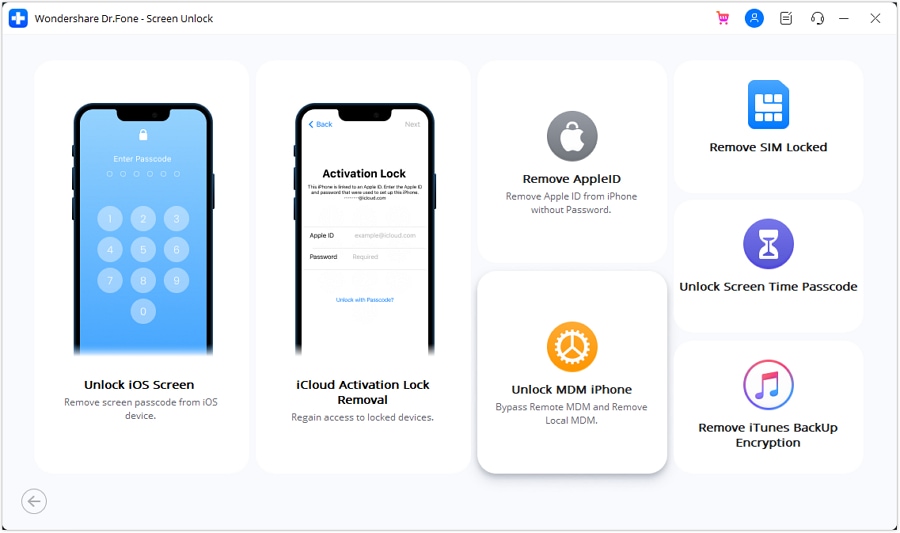
- Step 3: Select Bypass MDM, then click Get Start to proceed.
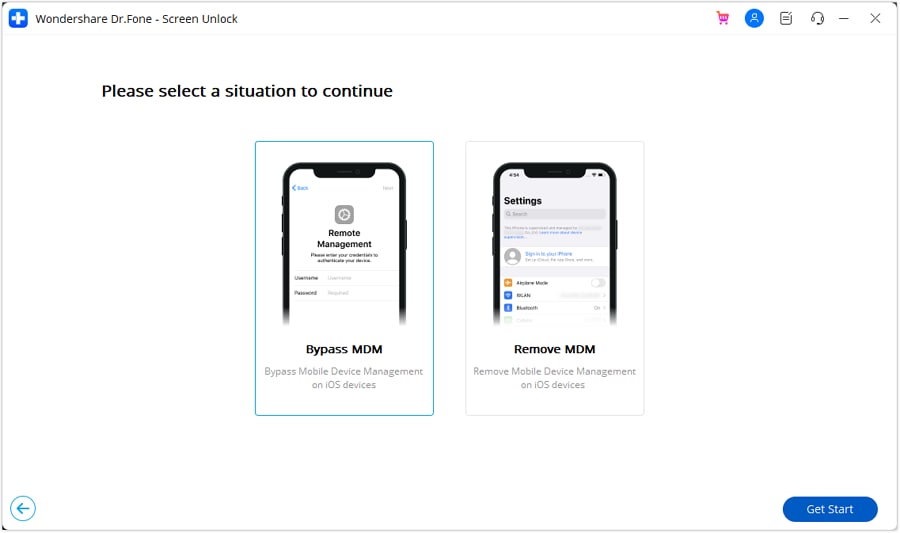
- Step 4: Please review the message carefully before initiating the MDM bypass process. Once you’ve read it, click Start to Bypass to proceed.
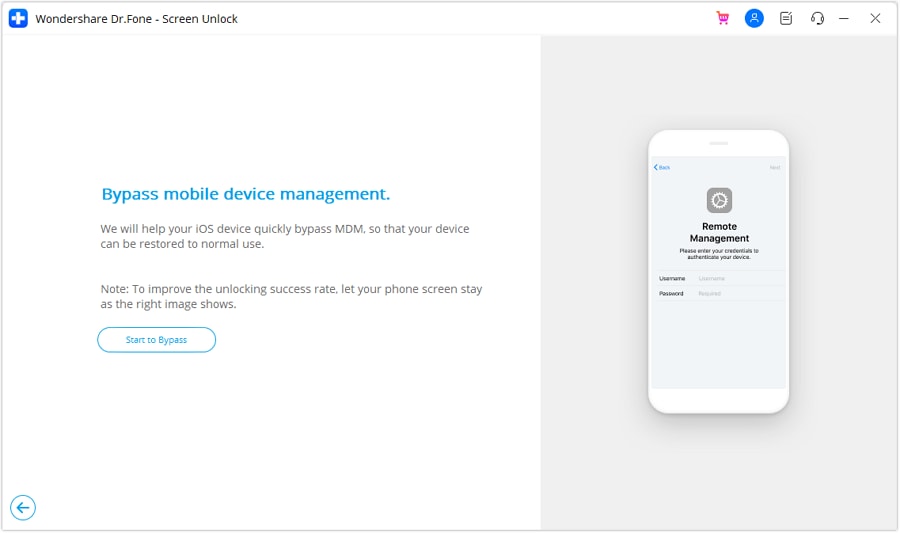
- Step 5: If prompted, go to your device’s Settings > Apple ID > iCloud and turn off the Find My feature. Next, click OK to initiate the MDM bypass.
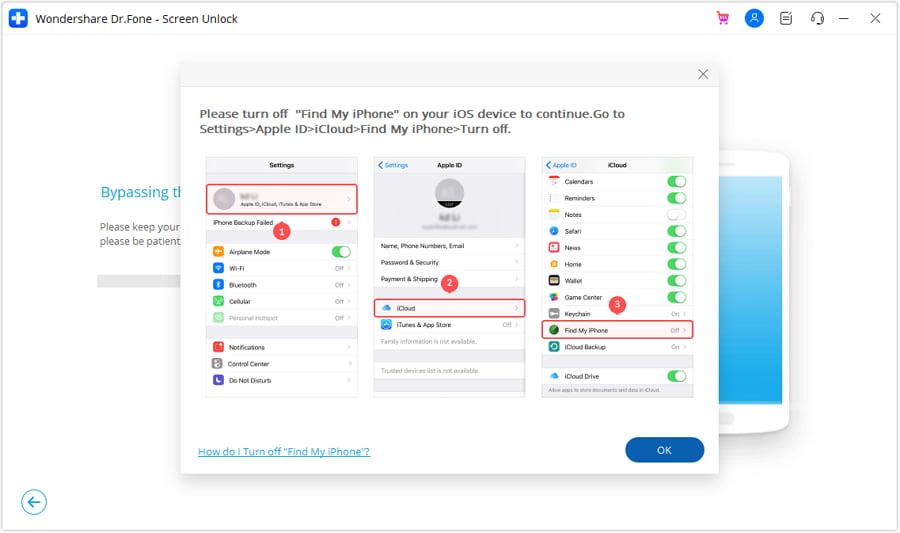
- Step 6: The software will display the progress of the bypass. Wait for it to complete.
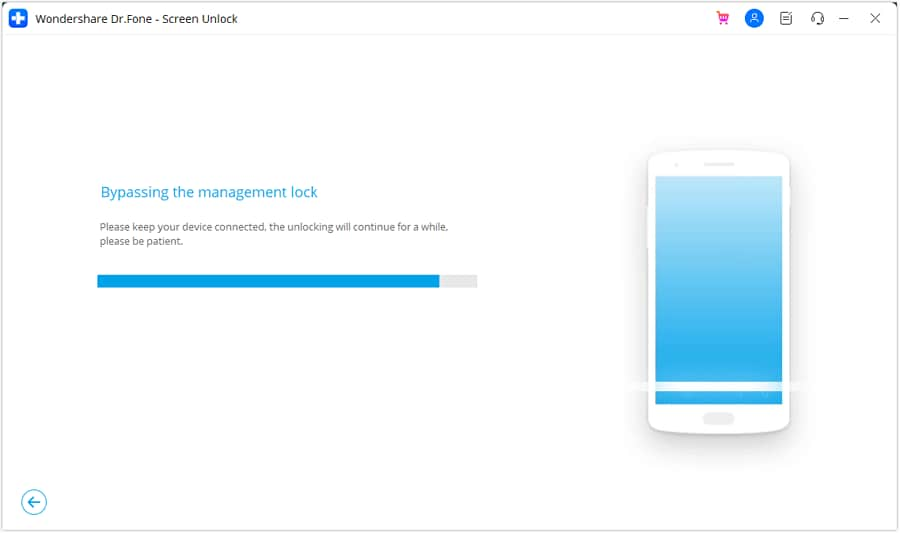
- Step 7: You’ll see a confirmation message once the bypass is successful. Click Done to exit. Your device should now be free from MDM restrictions.
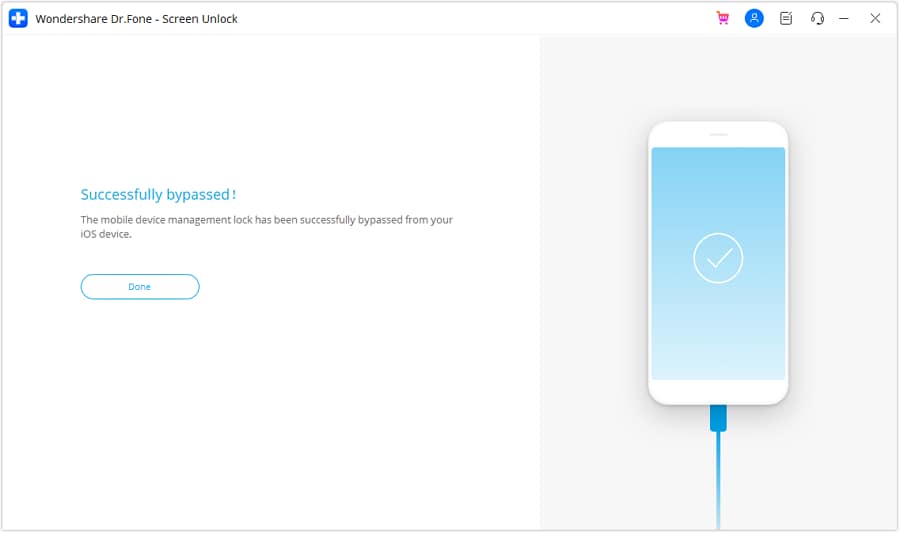
Fix No.6: Check and Adjust Auto-Lock Settings
Once you’ve tried all the fixes above, you might need to set up the Auto-Lock timeout again.
- Setup Auto-Lock on iPad
Here are the steps on how to change Auto-Lock on iPad devices:
- Step 1: Within the Settings app, scroll down the list on the left-hand side and tap Display & Brightness.
- Step 2: On the right-hand side of the Display & Brightness screen, tap the Auto-Lock option.

- Step 3: A list of time options will appear, ranging from 2 minutes to 15 minutes, as well as Never. Select the time you want your iPad to wait before automatically locking the screen after inactivity. If you want the screen to stay on indefinitely, choose Never.

Step 4: Once you’ve selected your preferred auto-lock duration, you can exit the Settings app. The change will be applied automatically.
- Setup Auto-Lock on iPhone
Here’s how to change Auto-Lock on iPhone devices:
- Step 1: Open the Settings app.
- Step 2: Tap on Display & Brightness, scroll down, and tap Auto-Lock.
- Step 3: Choose the desired time interval for your Apple iPhone 6s Plus to automatically lock. The available options typically range from 30 seconds to 5 minutes. You may also have the option to select Never if you prefer to have the screen stay on indefinitely until you manually lock it.

Conclusion
There you have it. This guide has equipped you with the knowledge and solutions to fix the Auto-Lock greyed out on your Apple iPhone 6s Plus or iPad devices. From identifying the reasons like Low Power Mode and MDM configurations to implementing actionable fixes, you can now change your screen timeout. So, turn off those restrictions, remove MDM profiles, and head back to Settings.
For an easy solution, use Dr.Fone Screen Unlock to bypass MDM restrictions, giving you control over your device. Whether it’s a work phone or a personal device under MDM, Dr.Fone can offer an efficient solution. With a few clicks, you’ll have the Auto-Lock back on track, ensuring your iOS device works again just how you want it.
Tips: Are you searching for a powerful Screen Unlock tool? No worries as Dr.Fone is here to help you. Download it and start a seamless unlock experience!
- Title: How To Change Your Apple ID Password On your Apple iPhone 6s Plus
- Author: Sophia
- Created at : 2024-07-15 00:05:52
- Updated at : 2024-07-16 00:05:52
- Link: https://ios-unlock.techidaily.com/how-to-change-your-apple-id-password-on-your-apple-iphone-6s-plus-by-drfone-ios/
- License: This work is licensed under CC BY-NC-SA 4.0.
